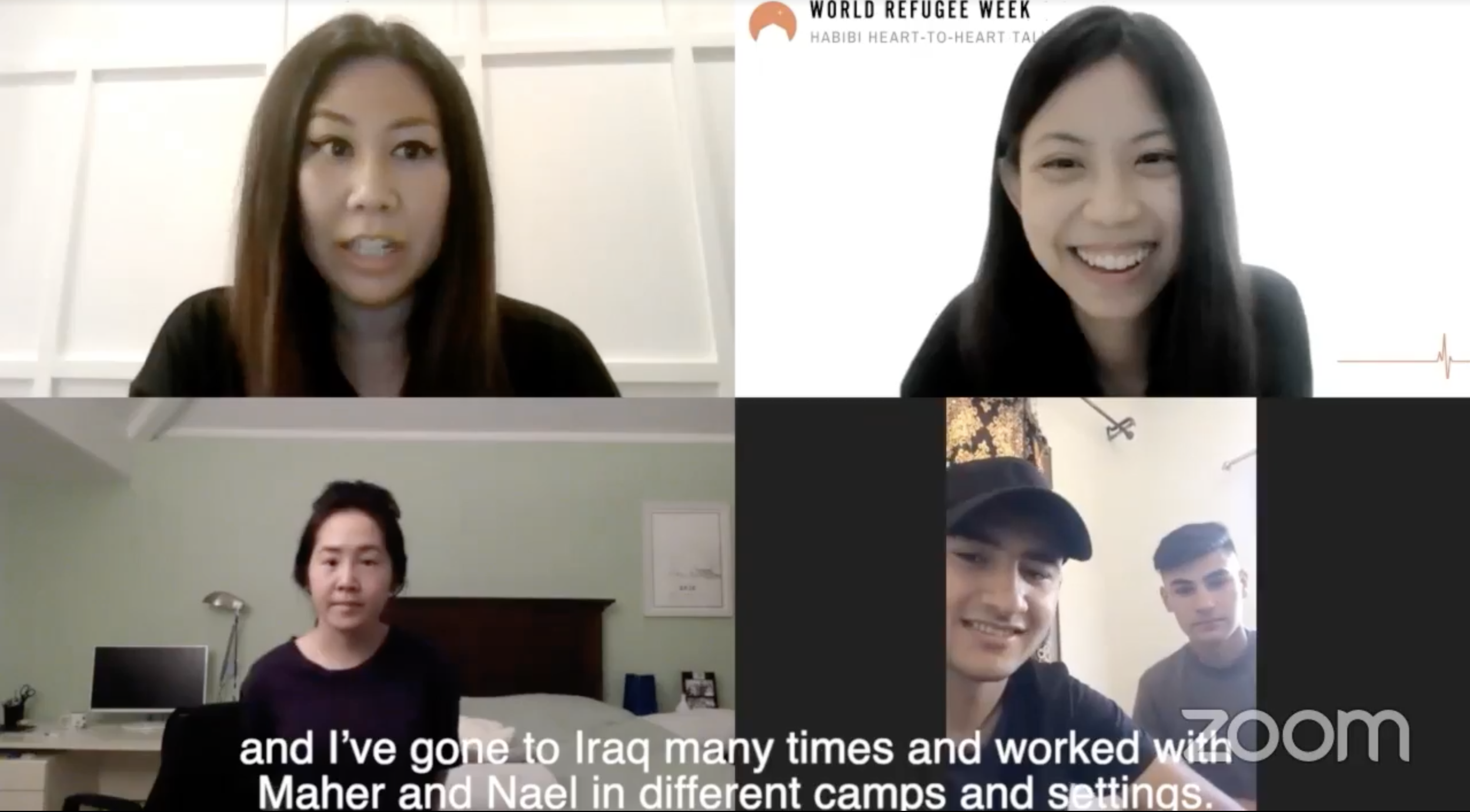Heart to Heart: One Year On // Education & Livelihood
6/27/2022 - From Heidi
Illustration by: Amy Ong
It’s almost 45ºC (113ºF) out and we are huddled in a little office space, where electricity cuts in and out depending on the number of hours of power the government is providing that day.
Brothers Maher and Nael are two of the seven forcibly displaced youth and young adults who are enrolled in our pilot computer program. Some of them have never used a laptop before, and we explain how to turn it on and how to use a mouse. We start them on computer terminologies that I realize I have come to take for granted, and a few typing games.
It’s all a little surreal to me. Just a month earlier in June 2021, I’d held a Zoom interview with the two brothers for our World Refugee Week “Heart to Heart” series.
They had shared about what school was like for them over the past seven years of their internal displacement (challenging), and how things had changed during the Covid-19 pandemic (even more challenging).
School had been put on hold indefinitely. They ended up doing homework over Telegram or catching up with learning through watching YouTube videos.
Caption: Screengrab from Habibi International’s interview with Maher (left) and Nael (right) in the “Heart to Heart” series for World Refugee Week 2021
Back then, Maher and Nael had also been talking with me off a borrowed laptop. I remember spending more than an hour on the phone with them prior to the interview, trying to guide them in setting up Zoom, interrupted by power cuts and spotty wifi.
The heart in hard work
Fast forward a year to June 2022, and Maher and Nael are now like fish in water on their laptops.
“At the beginning it was difficult,” Nael recalls, as we recount the year together. “We didn’t know anything about computers. But we worked really hard and we learnt a lot.”
Learned a lot, they definitely have. “Excel, PowerPoint…” Maher starts. They’ve also picked up Slack and Google Suites as platforms for collaboration and remote training, and designed presentations on Canva. And they’ve worked remotely on back-end reports, customer service emails, and other paid micro tasks for a US
e-commerce company.
But it hasn’t all been smooth sailing. On many of my weekly visits to their village, I’d arrive to find the group working in the dark through a power cut, their faces glowing from the light from their laptops. In the winter, they would be huddled in thick jackets or even blankets, around a portable kerosene heater.
We also had to work through all sorts of options for improving the internet stability and speed. Things could get frustrating, especially when remote training involved streaming videos and screen sharing.
Caption: Nael and Maher (first two from the left respectively) working in the dark through a power cut - a common occurrence where they are living.
So what was the highlight of the computer and remote work program for them? I wonder.
“Replying to customer emails!” Nael chimes in quickly. “Because I can help people to solve their problems.”
That takes me somewhat by surprise - and I am actually rather touched. I remember how many times they would be scratching their heads as they combed through all sorts of bizarre requests from confused or complaining customers. It made me think how entitled so many of us can get with our online purchases!
But I also remember Nael taking each email so seriously, making sure that his replies were professional and helping the others in the program to do likewise.
“Thank you for the opportunity,” both Maher and Nael frequently tell me.
“You know so many organizations are asking for workers who know Excel or Word. But Yazidis don’t know about this stuff,” another young man in the program had commented. “But now, look at us. We know.”
I can’t help but think that the whole new world of technology could open up for so many more young forcibly displaced persons – if they were just given the chance.
On her shoulders
Indeed, in a place where unemployment is high, access to dignified livelihoods can make all the difference.
In fact, over the past year, with a little support, Maher and Nael’s mother, Benefsh, has herself embarked on a small home business making cold processed, all natural soap.
I joined her on her second attempt to test and perfect the ingredient mix, technique and design.
It is quite the family affair. Benefsh weighs the various components. Maher and Nael help to combine the potentially flammable materials.
Then, Benefsh and her older daughter take over, pouring the mix into beautiful soap molds, while her youngest 9-year-old diligently stirs out the little air bubbles that accumulate.They work on the finishing touches together, and later lay the individual pieces out to dry.
Caption: Maher pours the soap mix into molds as his youngest sister waits for her turn to help.
Several months into her new venture, we asked Benefsh how it has been for her.
“I didn’t know if I could do it, and if anyone would buy my soap,” Benefsh told us. “But now I feel so happy that this is something I can do to provide for my children.”
Caption: Benefsh’s soaps laying out to dry before they are packaged and sold.
It has not been easy for Benefsh to raise her children on her own, after the sudden passing of her husband several years ago. But I can tell she is quietly proud of the fine young men Maher and Nael are becoming.
At the end of the school year, Nael shares that he has done well enough in his exams to be recognized in a year-end ceremony. I am probably more excited than him as I accompany him to the sik (local bazaar) to pick out a new coat for the occasion.
“You must be so proud of Nael!” I exclaim to Benefsh when I next see her.
“They all did well,” Benefsh smiles. “All of them.”
Coming full circle
On this year’s World Refugee Day, the 45ºC (113ºF) weather is back. But this time, we are launching our Learning Lab - a fully furnished computer lab equipped with laptops and more stable wifi, as well as a co-working cafe space and office.
Maher, Nael and some other youths had a hand in setting it up too, helping with organizing the space, cleaning, painting, scouting for furniture, and even choosing curtain colors.
Caption: Maher, Nael and friends after a hard day’s work of painting and cleaning out a storage space, which we’ve transformed into a Learning Lab
We’re excited about what this new development could mean for more young people like Maher and Nael.
And as I look back on the year I’ve been able to spend with them and their family, I can’t help but feel a
sense of hope.
The situation remains very volatile in their hometown, and there definitely are various other challenges they’ve
had to surmount. But the little steps they’ve made here regardless speak of how in spite of everything,
flourishing is possible.







